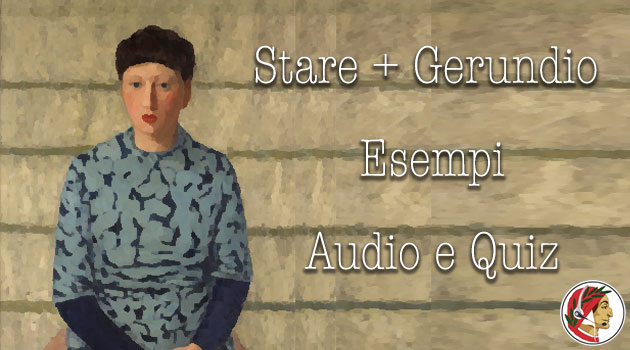Learn how to form Italian progressive structure using STARE + GERUND. Unlike English, which uses the verb “to be,” (essere) Italian progressive forms always require the verb stare. While the Italian gerund works across all moods and tenses, this introductory lesson covers the essential progressive forms: present, past, and future. Advanced structures will be explored in later levels.
Cosa impareremo oggi
👇🏻 links
- La formazione del gerundio – Italian Gerund
- Le forme progressive al presente – Present Progressive
- Le forme progressive al passato – Past Progressive
- Le forme progressive al futuro – Future Progressive
- Le supposizioni – Making Assumptions
- I verbi irregolari – Irregular Verbs
La formazione del gerundio – Italian Gerund
Building Italian progressive tenses requires combining the conjugated verb STARE with the Italian gerund of your main verb. The table below demonstrates gerund formation patterns. Progressive forms in Italian indicate actions actively unfolding across past, present, or future timeframes.
| INFINITO | DESINENZA GERUNDIO | ESEMPIO |
|---|---|---|
| -are | -ando | parlare → parlando |
| -ere | -endo | leggere → leggendo |
| -ire | -endo | sentire → sentendo |
Le forme progressive al presente – Present Progressive
| PERSONA | PARLARE (-are) | LEGGERE (-ere) | DORMIRE (-ire) |
|---|---|---|---|
| io | sto parlando | sto leggendo | sto dormendo |
| tu | stai parlando | stai leggendo | stai dormendo |
| lui/lei | sta parlando | sta leggendo | sta dormendo |
| noi | stiamo parlando | stiamo leggendo | stiamo dormendo |
| voi | state parlando | state leggendo | state dormendo |
| loro | stanno parlando | stanno leggendo | stanno dormendo |
The present progressive in Italian describes actions happening at this very moment. Use this form when you want to highlight that something is currently taking place. Keep in mind: Italian progressive tenses are optional. You can express the same idea with simple present tense. Both “Marco mangia” and “Marco sta mangiando” convey the same meaning – the gerund form simply adds emphasis to the immediacy of the action.
- Mia nonna sta imparando a usare WhatsApp!
My grandma is learning to use WhatsApp! - Il gatto sta dormendo sulla tastiera del computer.
The cat is sleeping on the computer keyboard. - I vicini stanno facendo lavori di ristrutturazione da settimane.
The neighbors have been doing renovation work for weeks. - Sto aspettando l’autobus da venti minuti!
I have been waiting for the bus for twenty minutes!
Le forme progressive al passato – Past Progressive
| PERSONA | PARLARE (-are) | LEGGERE (-ere) | DORMIRE (-ire) |
|---|---|---|---|
| io | stavo parlando | stavo leggendo | stavo dormendo |
| tu | stavi parlando | stavi leggendo | stavi dormendo |
| lui/lei | stava parlando | stava leggendo | stava dormendo |
| noi | stavamo parlando | stavamo leggendo | stavamo dormendo |
| voi | stavate parlando | stavate leggendo | stavate dormendo |
| loro | stavano parlando | stavano leggendo | stavano dormendo |
The past progressive requires imperfect STARE combined with the Italian gerund. This construction reveals what was taking place at a particular moment in the past, typically when another action interrupts it. It’s ideal for establishing context and background. The past progressive typically portrays an ongoing situation when a separate event occurs. Just like the present progressive, you can replace this form with simple imperfect: “Marco mangiava” communicates the same as “Marco stava mangiando.”
- Mentre stavo guidando in autostrada, ho sentito uno strano rumore dal motore.
While I was driving on the highway, I heard a strange noise from the engine. - Stavamo cenando quando è arrivato il postino con il pacco.
We were having dinner when the postman arrived with the package. - Stavamo facendo la spesa quando è iniziato il temporale.
We were doing the shopping when the storm started. - Mentre stavo studiando per l’esame, i vicini facevano una festa rumorosa.
While I was studying for the exam, the neighbors were having a noisy party. - Stava piovendo quando siamo usciti dal cinema.
It was raining when we left the cinema.
Le forme progressive al futuro – Future Progressive
| PERSONA | PARLARE (-are) | LEGGERE (-ere) | DORMIRE (-ire) |
|---|---|---|---|
| io | starò parlando | starò leggendo | starò dormendo |
| tu | starai parlando | starai leggendo | starai dormendo |
| lui/lei | starà parlando | starà leggendo | starà dormendo |
| noi | staremo parlando | staremo leggendo | staremo dormendo |
| voi | starete parlando | starete leggendo | starete dormendo |
| loro | staranno parlando | staranno leggendo | staranno dormendo |
The future progressive pairs future tense STARE with the gerund. This Italian progressive form indicates what will be occurring at a specific future moment. It’s particularly useful for discussing plans and making predictions.
- Domani a quest’ora starò volando verso New York per lavoro.
Tomorrow at this time I will be flying to New York for work. - Alle otto di stasera staremo guardando la partita al bar.
At eight tonight we will be watching the match at the bar. - Quando tornerai dalle vacanze, io starò ancora studiando per l’esame.
When you come back from vacation, I will still be studying for the exam. - Fra due ore i miei genitori staranno atterrando a Roma.
In two hours my parents will be landing in Rome. - Il prossimo weekend staremo traslocando nella nuova casa.
Next weekend we will be moving to the new house.
Making Assumptions
Italian progressive forms in the future tense can express assumptions about current situations. This usage allows you to speculate about what’s probably taking place at this moment. It’s a natural and frequently used construction in conversational Italian.
- Dov’è Debora? – A quest’ora starà facendo allenamento in piscina!
Where is Debora? – At this time she is probably doing training in the pool! - Diana è in montagna per il Capodanno: si starà divertendo come una pazza!
Diana is in the mountains for New Year’s: she is probably having a great time! - Marco non risponde al telefono: starà dormendo.
Marco doesn’t answer the phone: he is probably sleeping. - I bambini non ci sono: staranno giocando nel parco.
The children are not here: they are probably playing in the park.
I verbi irregolari – Irregular Verbs
Certain Italian verbs create irregular gerund forms. Below are the essential irregular gerunds you should memorize:
| INFINITO | GERUNDIO | ESEMPIO |
|---|---|---|
| bere | bevendo | Sto bevendo un caffè |
| dire | dicendo | Che cosa stai dicendo? |
| fare | facendo | Stiamo facendo colazione |
| tradurre | traducendo | Sto traducendo un testo |
| trarre | traendo | Sta traendo conclusioni |
These final two examples represent entire verb families. The gerund pattern of “tradurre” applies equally to condurre, produrre, dedurre, sedurre, and similar verbs. Likewise, “trarre” shares its gerund formation with distrarre, contrarre, attrarre, and related verbs.
Limiti d’uso – Usage Limitations
Italian progressive forms come with significant restrictions. They cannot be applied to every verb or situation. Mastering these limitations is crucial for proper use of the Italian gerund in progressive constructions.
1. State verbs – Don’t use progressive forms with verbs that describe physical or mental states:
- essere (be), stare (be standing), sedere (be seated)
- rimanere/restare (remain), avere (have), possedere (possess)
- giacere (lie), capire (understand), sapere (know)
- volere (want), potere (be able)
Exceptions: When these verbs indicate dynamic action instead of static state:
- Sta avendo molto successo.
She’s having a lot of success. - Il computer sta capendo le istruzioni.
The computer is understanding the instructions.
2. Duration and continuity constraints:
- ❌ Stava mangiando solo per cinque minuti.
He was eating for only five minutes. - ❌ Stava pulendo la stanza ogni tre giorni.
She was cleaning the room every three days. - ✅ Ha mangiato solo per cinque minuti.
He ate for only five minutes. - ✅ Puliva la stanza ogni tre giorni.
She used to clean the room every three days.
Differenze con l’inglese – Differences with English
The Italian progressive differs fundamentally from its English counterpart. In Italian, progressive tenses are optional choices that emphasize ongoing activity. English, by contrast, often requires the gerund for actions occurring simultaneously with the moment of speaking.
Comparative examples:
- Forma semplice: Marco legge il giornale.
Forma progressiva: Marco sta leggendo il giornale.
English: Marco is reading the newspaper. (only one option) - Forma semplice: Cucino la pasta per cena.
Forma progressiva: Sto cucinando la pasta per cena.
English: I am cooking pasta for dinner. (only one option) - Forma semplice: I bambini guardano la TV.
Forma progressiva: I bambini stanno guardando la TV.
English: The children are watching TV. (only one option) - Forma semplice: Ascolto musica mentre lavoro.
Forma progressiva: Sto ascoltando musica mentre lavoro.
English: I am listening to music while I work. (only one option) - Forma semplice: Piove molto forte oggi.
Forma progressiva: Sta piovendo molto forte oggi.
English: It is raining very hard today. (only one option)
This is an introduction to the progressive gerund for our freemium members. The complete lesson is available to students enrolled in our A2-B1 level courses.
The full version includes:
- Bilingual explanation in Italian and English.
- Additional examples with real-world usage
- Audio files featuring correct pronunciation by native speakers
- Special cases and exceptions
- Detailed grammar explanations highlighting key differences between Italian and English
- A comprehensive quiz with instant scoring to help you master the progressive gerund
Our premium courses also offer:
- Personalized homework corrections by native Italian teachers who monitor your progress and provide tailored feedback
- Live Zoom lessons designed to guide you toward a deeper, more confident mastery of natural Italian
Want to experience our complete lessons? Take the quiz on our homepage to receive free study materials perfectly matched to your current level!
Dante-Learning
Start Your Italian Language Journey Now








Grazie Riccardo, I love your emails – always very informative. Anna
Prego. Ciao.